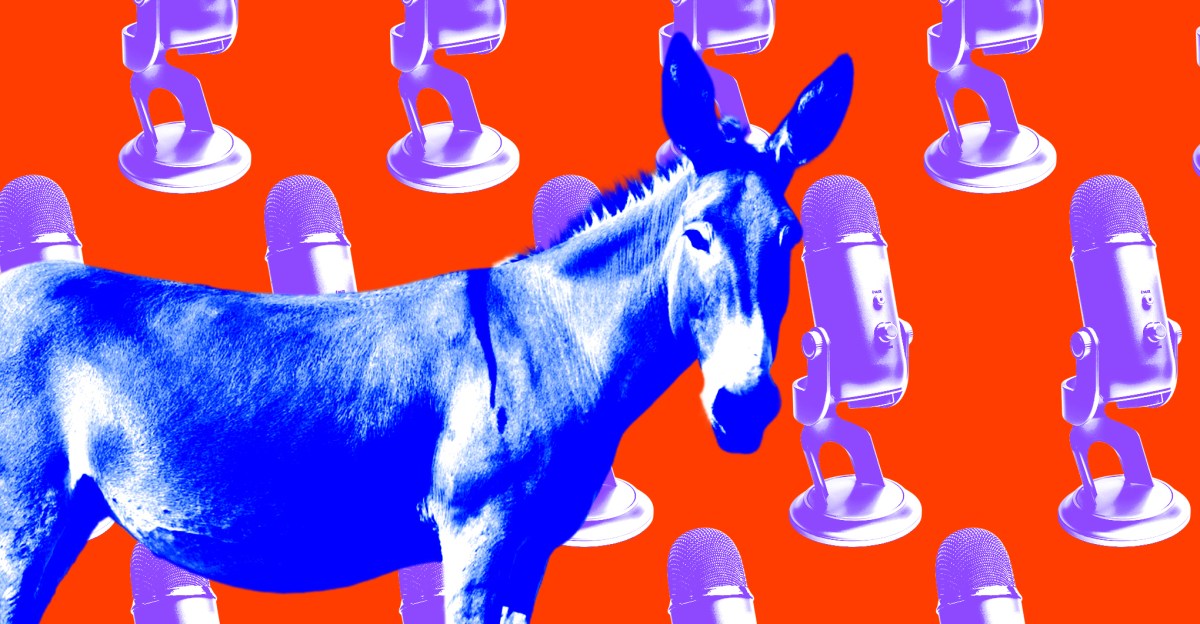Hello and welcome to Regulator. Today, I will attempt to regulate my own apoplexy.
Recently, Wired published an article revealing the existence of a secret Democrat influencer incubator that trained liberal and progressive content creators to push coordinated messaging across their shared social media platforms and paid them handsomely to do so. The fallout has been chaotic, at least in the left-wing influencer world: creators are shanking their rivals for participating in the program, and the paid influencers are trying to defend themselves for taking the money. But the controversy around the Chorus Creator Incubator Program stems from the fact that it was so secret: participants had to sign contracts that gave Chorus control of their interview bookings, limit what they said about other creators or non-approved political figures, and were forbidden from even acknowledging they were part of the program.
In response, Chorus — a group funded by the Sixteen Thirty Fund, a liberal 501(c)(4) that’s often drawn comparisons to the libertarian Koch Network and often outspends them — has stated that it was trying to organize left-wing influencers to match their counterparts in MAGA world. In a statement to The Verge, Chorus founder Brian Tyler Cohen defended the program and said that the program had received hundreds of new applicants since the Wired story. “I’m incredibly proud that Chorus has received financial support from over 1,000 individuals who recognize that there’s a desperate need for more pro-democracy voices in the online space. They want to fund a bunch of diverse creators to do this full-time who wouldn’t be able to pay their bills otherwise and we’re incredibly grateful.” (After the Regulator newsletter was sent to subscribers on Tuesday, The Sixteen Thirty Fund sent a second statement from president Amy Kurtz, disputing Wired’s claims about the restrictions Chorus placed on creators over guests, content, and disclosing their participation in the program.)
I technically understand what the Democratic establishment were trying to accomplish with Chorus. (The Sixteen Thirty Fund is not formally affiliated with the official Democratic Party.) I actually have significant experience with what they’re trying to counteract on the right. I also think they suck at it, and for the most characteristically Democratic Party reasons.
My longtime readers will know this about me, but if you’ve discovered me through The Verge, I should probably give you a little context. Last year, I published a memoir called The MAGA Diaries, which goes a bit into how I got ensnared in right-wing activism in my early 20s — specifically, how I got lured into the right-wing media career pipeline as a college student seeking a journalism internship in 2008, placed by my program mentor in a post-grad job at Tucker Carlson’s Daily Caller in 2011, and then was nearly sent to Wisconsin to work at a fake newspaper funded by dark money that wanted to undermine the teachers’ union protests, all under the guise of credentialing a “journalism fellow” to write hit pieces on them. (Instead, I quit the “journalism” network on the spot, yeeted myself out of Washington, and began a magazine-writing career in New York so I’d never have to deal with the conservative movement ever again. Unfortunately, the arc of history had other plans.)
The Chorus influencer program, in many ways, is a Dem-coded version of the right-wing journalism summer camp that I attended during my sophomore year of college. But let me back up a bit: I thought I had received a paid summer internship in journalism for “liberty-loving students,” funded through the Institute for Humane Studies at George Mason University, which promised to get me hired at a non-right-wing place like MSNBC. (Seriously, the program advertisement said that alumni got “placed” at MSNBC.) The generous internship stipend was contingent on me going to a weeklong journalism seminar and assisting in research about the Founding Fathers’ views on state-funded education. But looking back on it over a decade later, it was actually a training camp on how to be a proper libertarian thought leader. There were a lot of lectures about liberal media bias, breakout discussion groups on whether Obamacare was an overreach of federal powers, and tips on how to write a resume when applying for jobs. (And, of course, no one in my cohort got a job at MSNBC.)
Dozens of other right-wing journalism talent incubators exist inside the conservative movement, some of which have been around for decades, and are constantly learning how to leverage new technology for political gain. Over the years, other boot camps and programs have opened up for aspiring social media influencers, livestreamers, and the like. (I recently learned that the Leadership Institute, a group that’s been turning young college Republicans into powerful elected officials since the 1970s, just launched a conservative podcasting school.) But ask any right-wing influencer if they’ve ever gone to some training camp — hell, ask them in public — and not only will they quickly say yes, they’ll also tell you what program they enrolled in, who they took classes with, and what they thought of their coursework. They might even be proud of getting into some elite program or getting accepted into a certain seminar.
But one can’t simply copy the right-wing formula and paste it on the left. The famous Andrew Breitbart saying — “politics is downstream from culture” — isn’t just an observation, but an organizational principle on the right. If you can use culture to change people’s values, then you can then get them to vote a certain way. There’s a lot to be said about the right’s attempts to drive culture forward (or backward), but they were far better at manipulating and taking over where it existed on the internet — or, in most cases, ceding control and riding the wave of the internet entirely, so long as they ended up in power. On the internet, it helps to be shameless. Either way, MAGA influencers have the ability to define what is and is not culture, because their followers want to follow a culture warrior, dammit. (Why do you think they try to make everything about what is and is not “woke”?)
In contrast, I’m hardly surprised that Chorus and the Sixteen Thirty Fund went to these lengths to restrict what these creators could say: the octogenarians of the Democratic establishment, and the rising young leaders who remind said octogenarians of themselves, seem sclerotically incapable of existing in a media environment they cannot control. The culture is no longer run by blue donors in Hollywood and New York. After all, its last president, Joe Biden, had an extremely hostile relationship with reporters and celebrities asking too many questions about his age. And its last presidential candidate, Kamala Harris, was so allergic to appearing on popular podcasts that she would only do so if the hosts flew to her and conducted the interview on a set completely controlled by the campaign. She reportedly refused to appear on The Joe Rogan Experience if they had to go to the host’s Texas studio, and reportedly shelled out six figures to build a DC-based Call Her Daddy set for her interview with Alex Cooper, who records her podcast in California.
Though they’ve tried to avoid being described as a liberal copycat, the Sixteen Thirty Fund has been compared to the Koch Network, the secretive group of right-wing billionaires that created (among other things) the right-wing media training camps that the fund is trying to counter. (“We reject any notion that the right-wing has been more transparent in this area. STF takes great pride in supporting critically important causes,“ Kurtz said in her statement to The Verge.) As a Koch alumni (via technicality), I think they’re pretty dang similar, even if they’re somewhat faster to ‘fess up their involvement. Between 2009 and 2016, the Koch Network was unparalleled in funding the rise of the Tea Party — the candidate selection, the digital media apparatus, the voter turnout machine, etc. — to the point that the American political right briefly existed as this cadre of wealthy libertarian billionaires envisioned it: limited government, open borders, free trade, not too racist.
Then Donald Trump found Twitter, got elected president twice, the MAGA influencers overrode the think tank people and media training camp grads, and even though the Koch Network still technically exists, free-market libertarianism died in America. Republican voters may not have liked Trump back then, but they preferred his brand over a bunch of old billionaires trying to define what “Republican” meant, and now those billionaires are getting absolutely reamed by Trump’s tariffs.
So, yeah, I think it’s a very apt comparison.
Mia Sato covers influencers and the power of their parasocial relationships for The Verge, which is the massive other half of this story, and we go more into that below the fold. But before that, here’s some of The Verge’s latest stories about Regulator world…
“Temu, Shein, and Amazon Haul are about to get wrecked”: Months ago, Mia Sato pulled together this video explaining the de minimis tariff exemption on international packages and what would happen when Trump killed it in his trade war, because The Verge is staffed with doomscrollers who think too far into the future (myself included). That exemption formally expired last weekend, so…yeah, please enjoy this educational video.
“The Trump administration promised a fourth wireless carrier — America got a hot mess instead”: Once upon a time, TV provider Dish Network tried to enter the wireless market. Last week, it gave up and sold $23 billion worth of valuable spectrum to AT&T. Karl Bode delves into the complicated political backstory behind it all, and, unsurprisingly, it involves a lot of shady behavior in both Trump administrations.
“FDA approves new covid vaccine, but with new limits”: Emma Roth goes into the RFK Jr. of it all. Enough said.
I can rant about Democrats until the cows come home, but, ultimately, the point of Chorus was to mobilize these influencers’ followers — and that is a very, very new form of what a poli sci major might call “community outreach.” After angrily sending Slack messages to each other about it for a full Friday afternoon, we realized that we should probably enjoy our Labor Day weekend and then have a more fulsome, less rage-driven conversation about whether internet communities care about political sponcon.
Mia: There are a bunch of different industries that are colliding here: the influencer industry, the media (journalism, specifically), and politics. And each of those industries has its own set of norms and practices and expectations. Many of the influencers at the center of this saga have built platforms by blurring these lines — are they “reporters” regurgitating news and offering analysis? Are they “content creators” who happen to talk about politics and policy? Or are they messengers for a political party, an extension of Democratic Party messaging and voter activation?
What’s unique about this — and what is stoking some of the discontent and disagreement — is that a lot of people don’t see the issue with these creators taking money from politically aligned groups. They see it like partnering with a liberal brand to advance liberal causes. “The right does this, so we should, too,” is the thinking. I’m sympathetic to this argument, honestly. But the actions of the creators and of the group that has been brokering these dark money payments makes no sense if there really is nothing to hide. If this is something that Dems need to do to keep up with the current state of politics, why not say publicly what you’re doing to fight Trumpism? It almost feels like people are less upset about these undisclosed partnerships than they are about, like, undisclosed makeup or tech sponcon or something.
“People” being the progressive influencer community or their followers? Though the funny thing is, the moment I asked that, I immediately thought about the double standard in the MAGA influencer community and their following. It’s pretty much a given that MAGA influencers are the product of donor grants, training camps, academic programs, etc., and not only do their followers accept that, they find it absolutely necessary for the promotion of their cause — mainly because they think all the general cultural institutions that shape politics like “the mainstream media” are captured by the libs. So any sort of organizational advantage that the right can throw together, no matter how it’s funded, gives them an advantage in the culture wars.
People being the followers. And, yeah, I think there’s actually a demand from liberals that the Democrats figure out their own version of this. Which is why it’s sort of bizarre to me that this program was hush-hush, that they didn’t want creators to talk about specifics of it. A lot of followers don’t care and are actually happy that their fave liberal influencers are getting paid.
So it looks to me like Chorus and Sixteen Thirty took a bit too much inspiration from the early / mid-2010s Koch Network, which was notoriously secretive and really, really did not like people tracking exactly where its money went — media, ground game, etc. The New Yorker’s Jane Meyer once reported that they would run white-noise machines during their closed-door meetings to prevent people from listening. There’s an entire freaking chapter in my memoir where I learned that a bunch of the post-grad “journalism” jobs I applied for were connected in some bizarre, secret way to Koch-funded entities.
The Koch Network was effective, but only what it was designed for, which was to pump money into the Tea Party to make it appear as if it were actually a grassroots, libertarian organization. And, more importantly, that didn’t last very long at all. The Koch Network was completely incapable of stopping Trump in 2016, and every time it tried to “stand up against Trumpism” or reinsert small government back into the GOP’s core party values or whatever, it just… didn’t.
I truly think that it had to do with the fact that Americans overall were pissed off at the idea of a bunch of rich people trying to hide behind a bunch of ostensibly grassroots organizations, whereas other groups like Turning Point USA would come in with their influencer affiliate program, be pretty open about who they were funded by and what they did, and everyone was like, “Okay, sure, we’re chill with it.”
To me, it seems more like the Sixteen Thirty Fund is still in Part One of the Koch arc — that they have to pretend that their movement is actually grassroots and not something that’s turbocharged with donor money.
What’s interesting is that a lot of the creators do seem to have started from a grassroots place. It makes sense that the Dem establishment would want to tap into that, but the execution has been so painfully messy.
How much do you think the brand matters here? Like, is it a situation where the audience will accept someone who’s, like, “progressive” or “left-leaning,” but then react negatively to anyone that’s associated with the official Democratic Party establishment — i.e., anything Biden / Harris-coded? “Gave money to Israel”-coded?
I think there is some of that but the biggest frustration (where there is any) seems to be about the lack of transparency. I feel like if there was a DSA adjacent group doing this, people would also be mad.
So I’ve covered my share of MAGA influencer civil wars, for (oh, god) 10 years, and on the surface they’re kind of similar: so-and-so is taking money from this guy secretly! But clearly, MAGA hasn’t suffered from it. This is the first time that the Democrats have had actual community internet drama. Tell me if I’m being totally cynical, or are the Dems actually handling this meltdown worse than, like, any corporation caught in a sponcon scandal?
I do think the damage control is a little clumsy — I think it looks bad to have none of the content creators respond to Wired prepublication, and then for them to all make videos the next day saying, “Nothing to see here!” Why not say that to Wired from the jump? And if the defense is that Chorus doesn’t let influencers talk to the media… Well, that’s weird, too!
I don’t know how long this will live on, though. People only have so much bandwidth to be mad about this, and if there’s one thing that’s certain about influencer culture it’s that there will always be some new thing that is dividing people. One thing I keep thinking about is how not upset audiences seem to be about the payment element, so much so that I saw a lot of viewers actually say they were glad somebody was paying creators for their work. People are primed to view ads like organic content and this idea of “selling out” is not really a thing like it was 20 years ago. Payment is almost implied — but it still looks bad when you’ve been getting money without disclosure.
Or if you’re following what happens in Congress (watch this space), farewell to August recess. See you next week, and congrats to America’s royal couple:
0 Comments
Read the full article here












